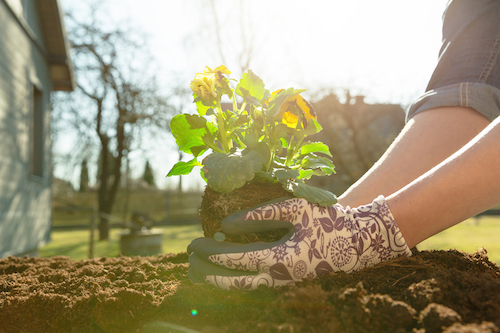 On an outdoor deck at the UCLA's Steward and Lynda Resnick Neuropsychiatric Hospital sits a garden.
On an outdoor deck at the UCLA's Steward and Lynda Resnick Neuropsychiatric Hospital sits a garden.
Once a neglected garden bed, the small patch of green oasis in an otherwise chaotic environment has been transformative not just for the hospital, but for patients.
In the fall of 2014, patients at the hospital told staff they wished there were more outdoor programs available to them. Heeding the call, a team of nurses, occupational therapists and social workers began exploring the idea of creating a garden for patients to be used for therapy.
They used $350 worth of gardening materials like plants, soil and tools and brought the 2.5 by 10-foot plot of land back to life. Patients helped plant and select succulents, flowers and herbs for the garden.
Staff at the hospital noticed a benefit to patients almost immediately.
“In the sunlight outside on the deck, patients enjoyed the exposure to a combination of many natural materials. Part of the milieu was the fragrance of the plants in the sunshine that received favorable comments. There was also plenty of room to move around. The therapeutic options offered inside the units typical involves sitting and discussion of personal dilemmas and possible solutions,” Huibrie Pieters, PhD, associate professor at the UCLA School of Nursing, told Theravive.
“We found that the patients enjoyed being in nature and the social interaction, but even more than that, most patients reported improvement in motivation. Also, the desire to nurture and cultivate life was important and lent itself beautifully to the metaphor of a patient’s own healing,” she said.
Curious about the benefits of “green therapy” on patients with severe mental illness, Pieters began a qualitative research project into the garden.
Spanning from July 2017 to February 2018, the research examined 25 in-patients at the hospital. Each of the patients involved with the study represented a variety of diagnoses, most commonly depression and anxiety disorders.
On a weekly basis each patient engaged in a preparation session then accompanied staff into the garden to work. Patients watered plants, turned soil and picked flowers and herbs. Following their time in the garden, the patients were interviewed once by a study author, then again by a social worker involved with the project.
The study found that patients found the garden to be an overall positive experience with many patients describing their enjoyment of nature and the social aspect of the garden.
“Many patients feel isolated, without much sensory stimulation or activity to fill their days. There is value in obtaining a new skill set or hobby that they can continue outside of the hospital setting. This observational study showed that gardening offered a low-cost, low-risk therapeutic intervention,” Pieters said.
One patient described the garden as similar to a community of plants. That garden requires care and people to tend to it. In a similar way, the patient was reminded that they needed to take care of themselves and attend to their own needs, as they did with the plants.
Other patients reported feeling productive and worthwhile, as well as finding a way to get their mind off problems they were facing. Another noted being out in the garden, rather than stuck indoors at the hospital as an inpatient allowed them to not feel so confined and instead feel peaceful.
Pieters says that given the relatively low financial investment, she has been very pleased with the impact the garden has had at the hospital.
She notes that the patients who are involved in the garden are deeply sick and can sometimes feel alienated and isolated due to their mental illness. Yet, by being outside and gardening, they have a strong sense of belonging.
The garden therapy program is continuing at the hospital, with plans to extend it to other areas.
“We hope to inspire and empower other mental health clinicians to integrate gardening techniques into their practice and expand on our exploratory research. This expansion has already started in the other units in the hospital where the study was done,” Peiters said.
Elizabeth Pratt is a medical journalist and producer. Her work has appeared on Healthline, The Huffington Post, Fox News, The Australian Broadcasting Corporation, The Sydney Morning Herald, News.com.au, Escape, The Cusp and Skyscanner. You can read more of her articles here. Or learn more about Elizabeth and contact her via her LinkedIn and Twitter profiles.